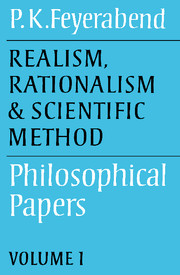Book contents
- Frontmatter
- Contents
- Introduction to volumes 1 and 2
- PART I ON THE INTERPRETATION OF SCIENTIFIC THEORIES
- 1 Introduction: scientific realism and philosophical realism
- 2 An attempt at a realistic interpretation of experience
- 3 On the interpretation of scientific theories
- 4 Explanation, reduction and empiricism
- 5 On the ‘meaning’ of scientific terms
- 6 Reply to criticism
- 7 Science without experience
- PART 2 APPLICATIONS AND CRITICISMS
- Sources
- Name index
- Subject index
6 - Reply to criticism
comments on Smart, Sellars and Putnam
Published online by Cambridge University Press: 05 June 2012
- Frontmatter
- Contents
- Introduction to volumes 1 and 2
- PART I ON THE INTERPRETATION OF SCIENTIFIC THEORIES
- 1 Introduction: scientific realism and philosophical realism
- 2 An attempt at a realistic interpretation of experience
- 3 On the interpretation of scientific theories
- 4 Explanation, reduction and empiricism
- 5 On the ‘meaning’ of scientific terms
- 6 Reply to criticism
- 7 Science without experience
- PART 2 APPLICATIONS AND CRITICISMS
- Sources
- Name index
- Subject index
Summary
PROLIFERATION
In writing the papers which are discussed, and criticized by Smart, Sellars and Putnam, my aim was to present an abstract model for the acquisition of knowledge, to develop its consequences, and to compare these consequences with science. With respect to the last point it may be expected that a comparison of historical phenomena with epistemological views or models will lead to new historical evidence, and to new ideas concerning the actual structure of science (or law, or philosophy, or commonsense). But it is also important to realize that one must not allow this structure to interfere with the models. Such models tell us how to proceed if a certain aim is to be achieved. In this way they form a basis for the criticism as well as for the reform of what exists. It is clear that a theory of knowledge which is built up with such a purpose of criticism and reform in mind will be fairly different from an analytic theory that relies on the maxim that in the battle between the actual and the idea the latter must be regarded as a mere fancy, as a flight from reality, as a castle in the air which shrinks into insignificance when confronted with the hard facts of (scientific, legalistic, commonsense) life.
The model which underlies my own discussion has as its aim maximum testability of our knowledge. No argument will be given for this aim here.
- Type
- Chapter
- Information
- Realism, Rationalism and Scientific MethodPhilosophical Papers, pp. 104 - 131Publisher: Cambridge University PressPrint publication year: 1981
- 10
- Cited by



